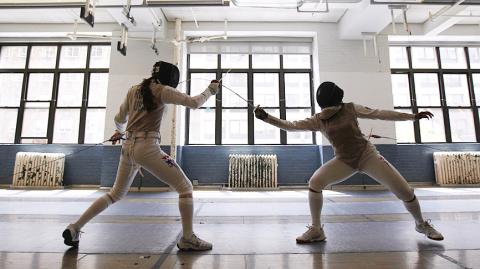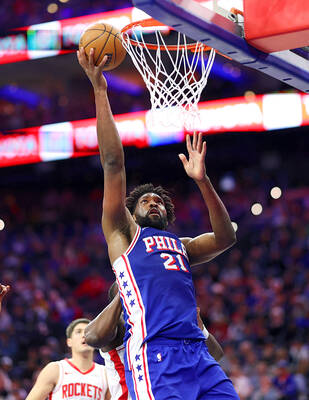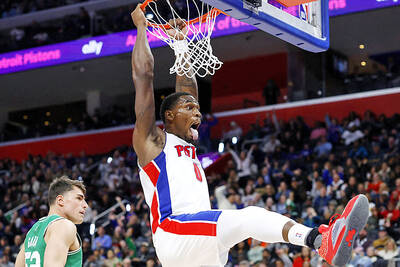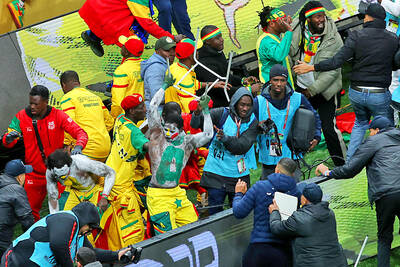Almost 30 years ago, the tight-knit sport of fencing suffered a tragic accident with the horrific death of world and Olympic champion Vladimir Smirnov.
While the Soviet fencer’s death at the Rome World Championships in 1982 shocked the sport to its core, the fatal accident proved to be a turning point in making fencing safer.
Smirnov was fencing West Germany’s Matthias Behr in Rome. Both stood over 1.82m tall and were described by coaches and teammates as massively strong and fast, their attacks akin to an oncoming locomotive.

Photo: Reuters
They attacked each other simultaneously in an attempt to establish an advantage, or what is known in fencing as the “right of way,” Smirnov’s former coach Alexander Perekalsky, 87, said in a recent telephone interview from Moscow.
“Smirnov tried to block Behr’s blade with an upward parry, that Behr avoided. Both collided and Behr’s blade broke on Smirnov’s chest and by inertia he continued forward,” Perekalsky said.
“The broken blade hits a brand new mask and goes through, hitting him above the left eye and into his brain,” he added.
Smirnov died about 10 days later after being taken off life support, his death mourned by the entire fencing world.
Behr left fencing in the aftermath of the accident, but returned to win the foil silver at the 1984 Los Angeles Olympics, and headed Germany’s national fencing training center in Tauberbischofsheim.
Ioan Pop, the international technical director for fencing’s governing body (FIE), said the current standard of safety in the sport owed much to the accident 30 years ago.
“It was absolutely the accident and the death of Smirnov in 1982, in Rome,” said Romanian Pop, who won two Olympic team bronze medals in saber.
Pop is responsible for making sure fencing at the London Olympics is safe as well as enjoyable to watch.
While safety is paramount, the real challenge is to make sure spectators can see the action, no easy task given the tip of a fencing blade is believed to be the second-fastest moving object at the Olympics after the marksman’s bullet.
Massive floor lights wrapping around the fencing area will flash when the wireless electronic scoring equipment is set off by a touch, either on or off the valid target.
Slow-motion instant replay for judges, and new for Olympic spectators this year, makes decisions more transparent. That is a big improvement from the past, when national interests very often hid behind the subjective reasoning of the referee.
And in foil, the lightest of the three weapons that include epee and saber, the bib — or area below the chin — is now a valid target, increasing the pace of a bout.
In an era of ballistic-grade fabric for uniforms, stronger steel, more rigid masks that stand up to 12kg punch tests and the banning of the running attack in saber, safety has improved and injuries severe enough to knock a competitor out of competition remain low.
Despite the dramatic images of blistering clashes with swooping metal weapons and ear-piercing screams of aggression, the sport is significantly safer than American football, soccer or basketball, according to a five-year study by the United States Fencing Association published in 2008.
When compared with a database of collegiate sports injuries, the association’s study, led by chief medical officer Peter Harmer, found injury rates 50 times greater in soccer than in fencing.
Between 1995 and 2005, fatal injuries because of participation in US high school and collegiate football reached 143,63 deaths for basketball and 20 for soccer. In the past 100 years there have been no reported deaths in US fencing.
Worldwide since Smirnov, Harmer said there are just seven confirmed fatalities.

The Philadelphia 76ers, fueled by 36 points from Tyrese Maxey and a triple-double from Joel Embiid, on Thursday beat the Houston Rockets 128-122 in an NBA overtime thriller. Cameroonian big man Embiid scored 32 points, grabbed 15 rebounds and handed out 10 assists, posting the ninth triple-double of his career to help the Sixers end the Rockets’ three-game winning streak. Rockets star Kevin Durant scored 36 points and Amen Thompson added 17, but Thompson was scoreless in the fourth quarter. Even so, the Rockets led by nine midway through the final frame, Maxey tying it at 115-115 with 40.1 seconds left. Durant missed a

Tobias Harris on Monday scored 25 points as the Detroit Pistons held off the Boston Celtics to score a 104-103 victory in their top-of-the-table Eastern Conference showdown. Harris was one of four Detroit players to finish in double figures, with Jalen Duren adding 18 points and point guard Cade Cunningham scoring 16 points with 14 assists. The win sees Detroit extend their lead at the top of the Eastern Conference to 31-10, 5.5 games ahead of second-placed Boston, who fell to 26-16 with the defeat. Jaylen Brown led the Celtics scoring with 32 points and almost snatched victory in the

The Milwaukee Bucks’ Giannis Antetokounmpo on Friday said that he will probably be out for an extended period after hurting his right calf again after a similar injury caused him to miss eight games earlier this season. Antetokounmpo had his right calf wrapped in the first half of their 102-100 loss to the Denver Nuggets. He did not appear comfortable the rest of the night and left for good with 34 seconds remaining. “At the end, I could not move no more, so I had to stop playing,” Antetokounmpo said. The two-time NBA Most Valuable Player said he expected to undergo an MRI

The chaotic scenes which tarnished Sunday’s Africa Cup of Nations (AFCON) final will forever overshadow a tournament that had until that point been a great success for hosts Morocco, on and off the pitch. Everything appeared set up for Walid Regragui’s Morocco side to cement their status as Africa’s preeminent footballing force as the continent’s top-ranked team made it to the final against Senegal in Rabat. Home advantage unquestionably brought extra pressure on the 2022 FIFA World Cup semi-finalists, but it also perhaps played into their hands for the controversial penalty award at the end of normal time in the